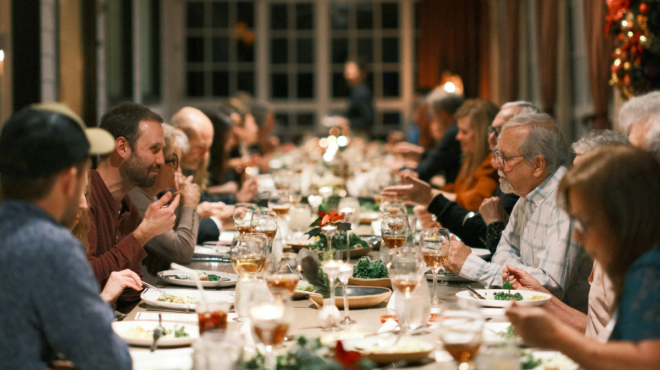 I recently read the book by our Presiding Bishop, Michael Curry, Love is the Way. If I gave you my takeaway in just a few words: God is Love, and Love is the way things work—really work—in God’s creation, in the universe. It’s as if Love is the energy that ultimately flows through all created things. And this got me thinking, because following this logic (God = Love = “the energy and way things really work”), it seems to me we continually, day by day, make choices in our lives either to follow this way of Love (the way of God, and Jesus), OR some other ways. The other ways are not-Love, not-God. The difficulty for us is that the “other” not-God ways seem very natural.
I recently read the book by our Presiding Bishop, Michael Curry, Love is the Way. If I gave you my takeaway in just a few words: God is Love, and Love is the way things work—really work—in God’s creation, in the universe. It’s as if Love is the energy that ultimately flows through all created things. And this got me thinking, because following this logic (God = Love = “the energy and way things really work”), it seems to me we continually, day by day, make choices in our lives either to follow this way of Love (the way of God, and Jesus), OR some other ways. The other ways are not-Love, not-God. The difficulty for us is that the “other” not-God ways seem very natural.
Millions of years of evolution have coded in our DNA, a law-of-the-jungle operating system that teaches us to be afraid of predators and “other” things we think threaten our survival. But! God’s story—the whole story told in our Bible from Abraham to Moses to the prophets straight through to Jesus—can be read as the Spirit of God calling to grow into another way, a higher way of being human . . . one that works better for the survival of us all, as a people. God’s people. Paul called this “a New Creation.”[1] When God supposedly chose “a people,” God had a purpose for them in the choosing.[2] The purpose is to show all the world how the way of Love is the way things really work.
What is the opposite of God’s way?
What is the opposite of God’s way—the way of Love? I heard Bishop Curry discussing this topic with our Bishop Rob Wright recently on his podcast, For People. The opposite of living a loving life is not leading a hateful life, Michael B. Curry says. Hate is but one manifestation of the real problem, “unenlightened self-centeredness: putting oneself at the center of the universe and everyone else is the periphery . . . when that happens, all sorts of destructive evil becomes possible.”
Instead, he insists, “Every humanly created evil that has ever been done has had at its root this kind of selfishness that leads to a kind of fear that demonizes and puts down others, a fear that leads to bigotry and injustices directed at people. It leads to my group, or my religion, or my political party.”
This selfishness, Bishop Curry explained, destroys families, churches and communities, countries, even our entire planet, and certainly our democracy. “January 6 was not about changing from one political structure to another. It was about self-centeredness writ large and run amok. This democracy will not work when everybody works on the basis of their own self-interest and not for the common good. It can destroy nations, even the face of the earth; our selfishness could well destroy this climate and make it uninhabitable.”
The way things do NOT work
So please allow me to amend my takeaway: if Love is the way things work for God, self-centeredness is the way things do NOT work. Bishop Curry connects self-centeredness to lots of evil things, but I believe it is because all things are connected. We are interconnected, even if we do not know it or recognize it. We choose, moment by moment, either to work with the way God works (i.e., love) or against the way things work (self-centeredness, which is another way to describe “sin”).
And God is calling us to grow beyond our self-centeredness and into a New Creation of caring. To not just care about ourselves, but in ever-expanding circles of caring, compassion, and responsibility for one another and the world God has created and is continuing to create through us. You can agree with it or not. You can go with “the way things really work” . . . or not.
The Work of Generational Poverty
All this was going through my mind as my teammates at ECF focus this month on the issue of generational poverty. Generational poverty is more insidious than simply falling on hard times from which one might recover after a while. It is what occurs in families when at least two generations have been born in poverty and lack the tools and education to move out of their situation. I imagine it is like being in prison, or more precisely, being enslaved by economic and legal systems that have trapped people in poverty, making escape seem impossible. It is a system that does not work, and the hallmark of generational poverty is hopelessness.
It should be the work of God’s people to inject hope and love into such a system to get things working better. Doing the work of Love connects the disconnected, lost, and broken pieces that God intends to heal and make work better. This is the good news of the Gospel; that Love will always triumph eventually over self-centeredness and even death.
There are meaningful ministries supported by our diocese to give hope and find solutions for our brothers and sisters. And the purpose of ECF is to enable and empower those ministries further.
[1] Ephesians 2:10
[2] Isaiah 42:6, Luke 2:32












